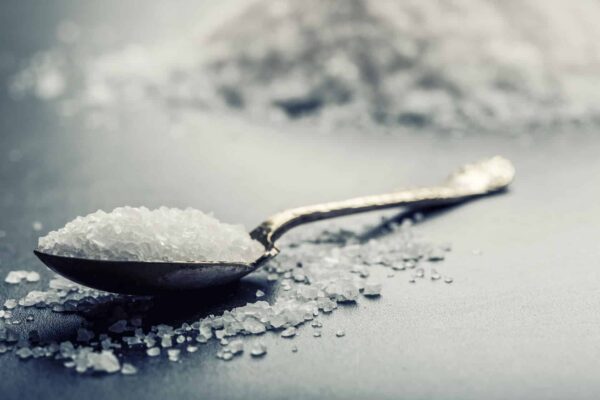When you go to the grocery store and start checking things off your list, you probably don’t think of all the secret ingredients you’re adding to your cart. Unless you’re counting calories, you may not even look at the ingredients at all. The food industry is hoping you’ll continue ignoring these labels, because it allows them to add salt to almost everything you eat. Even if you never add salt to your food, you are still likely consuming more than is recommended by the FDA.
Some of the top offenders for added salt are bottled dressings and sauces, cured meats and fish, cheese, pickles, canned soups, and snack foods like popcorn, pretzels, and chips. Even one serving of low-sodium soy sauce has 18% of the recommended daily value of sodium.
Why Is There So Much Salt?
You may wonder why food companies add so much salt to our processed foods. Consider this, in the time you’ve spent reading this article, have you started to salivate a little? Are you craving chips or cheese? Therein lies your answer. Salt is addictive and delicious. If food companies can get us hooked on the saltiness of the food we purchase, they can get us to purchase more of each food. We keep coming back like trained rats. In short, we’re addicted.
What Does Salt Do To Our Bodies?
Salt, if consumed in excess, can wreak havoc on your body. Here are a few examples of what salt can do to your system if you eat excessive amounts of sodium.
Kidneys: The primary function of your kidneys is to process fluids and extract urine from your body. This process relies on a balance of sodium and potassium in your bloodstream. If you have an excessive amount of sodium in your system, your kidneys won’t be able to extract the water. This causes you to retain water, which increases your blood pressure and puts strain on your blood vessels. Eventually, this can cause kidney problems.
Arteries: When your blood pressure rises, more strain is put on your arteries. This can lead to narrowing and hardening of the arteries. Over time, this can lead to organ failure and death.
Heart: When your arteries constrict due to high blood pressure, your heart gets less blood flow and less oxygen. At first, this can manifest as angina (chest pain from exercise). Eventually, it can cause a heart attack, which could be fatal.
Brain: In the same way that constricted arteries are damaging to the heart, they are also damaging to the brain. A decrease in blood flow and oxygen can lead to vascular dementia, or a stroke.
How Much Salt Should We Eat?
Sodium needs vary by age, gender, and lifestyle. In general, children should consume no more than 2,200 mg. of sodium every day. For adults, the CDC recommends about 2,300 mg. per day. If you have hypertension or pre-diabetes, you should be aiming for about 1,500 mg. Unfortunately, about 89% of people were exceeding that amount as of 2012. Children between the ages of 9-13 are especially at risk of over-consuming, as they eat between 3,000-3,300 mg. per day. Even if you consciously avoid table salt and canned foods, it can be hard to escape salt. Two slices of white bread contain about 400 mg. Imagine all the peanut butter and jelly sandwiches kids eat (or worse chicken tenders and fries,) and it’s easy to see why this is such a problem.
A Little Sodium Is Still Essential!
Even with all these scary outcomes and the seemingly endless amount of sodium in everything you eat, it’s important to remember that some salt is still necessary. Your body needs a certain amount of salt to function optimally (as seen in the kidneys example above). In a 10-day study, volunteers were deprived of all forms of sodium. The disturbing results included a total loss of taste, fatigue, nausea, and dark and sticky blood. Almost immediately after consuming sodium, the volunteers were able to taste again. They fully recovered.
Sodium is a vital part of your body’s overall health. Without it, you would cease to function and your health would rapidly deteriorate. Remember that sodium, like all things, just needs to be consumed in moderation. You can indulge every once in a while, but try your best to keep your daily sodium levels in check. A great way to do this is to get familiar with the amount of sodium in your favorite foods, and try to find healthier, fresh alternatives. You can also find substitutes for table salt in your favorite recipes. Instead of adding salt to your food after it’s prepared, try adding healthy spices like cumin, cinnamon, oregano, thyme, or rosemary. Your food will be more flavorful and your organs will thank you. For all your questions about your diet and whether or not you eat too much or too little salt please contact Peninsula Doctor.


